Inspired by the outdoors, Cai Fox supports sustainability reporting

Cai Fox joined UNC Charlotte in 2024 as the assessment coordinator in the Office of Sustainability. Fox coordinates data gathering, information management and reporting for the assessment of campus sustainability from initiatives to operations. Fox talks about discovering his passion for sustainability and what his reports reveal about the University’s efforts.
What specifically brought you to Charlotte?
I really love the Charlotte area and its ability to offer a diverse number of activities, and my partner was also moving down here to work with NASCAR. To the University specifically, it was Charlotte’s commitment to sustainability and environmental stewardship that really aligned with my personal values. Sustainability is integrated into many things and it’s great to be part of a team that supports the broader mission of creating a more sustainable future.
What specifically about sustainability matters to you?
I believe sustainability is all about balance — meeting the needs of today without compromising the ability of people in the future to meet those needs. For me, that comes down to what our choices are. Understanding that our choices have a lasting impact, from the paper we buy, to what car we purchase, to our energy use. There are so many choices that we all make that impact the sustainability of the future and today. It’s a great thing to be a part of.
What is STARS exactly?
It stands for the Sustainability Tracking Assessment and Rating System and is run by the Association for the Advancement of Sustainability in Higher Education, or AASHE.
AASHE gathers academic, engagement, operational, planning and administrative data to assess, evaluate and report a university’s sustainability performance and progress; it does this for hundreds of universities across the globe.
The STARS reporting system has four levels: bronze, silver, gold and platinum. There are 13 platinum universities in the world and obviously that’s everybody’s end goal. In the latest report from 2023, Charlotte was ranked silver. We’re working hard to get to gold.
How can students, faculty and staff contribute to ongoing sustainability efforts to help get the University to gold status?
Stay up-to-date on the latest sustainability trends and news and understand how that applies to yourself and the University. Also, get involved in our sustainability events, such as our Earth Month celebrations in April. There are several other sustainability-related events advertised on the Office of Sustainability website.
Are there any other analyses or reports that you’re currently working on?
We’re always working on different reports. We recently submitted our annual state waste data report to the Department of Environmental Quality for North Carolina. We also received Bicycle Friendly University bronze status this past year, which extends from 2024 to 2028. There are also sustainability aspects in our Times Higher Education and Princeton Review reports that we contribute to. We also look at our greenhouse gas emissions, and we help with LEED certification of buildings.
How does the University use assessments and reports to track their progress and sustainability?
We’re always looking at how we do compared to our peer institutions. So that’s everything from looking at institutions across the nation and the globe that are of similar size to us. We also look at our peer institutions and how we compare to other UNC system universities. STARS helps us evaluate how we are doing relative to other universities on everything from academics to engagement, operations and planning.
Was there a specific moment that inspired you to pursue a career in sustainability?
When I first started at Indiana University, I just wanted to be in business. That was my initial thought on the career path, I wanted. In the summer of my freshman year, I decided to go to Colorado for the first time and worked as an outdoor educator for a summer camp. I had grown up being outdoors, fly fishing, running around in the woods and having fun, but this was the first time that I got to really see the power and importance of nature. Camping and the overall outdoor educator experience took my love for the outdoors a step further. That gave me a passion for preserving the environment and understanding the importance of educating people on sustainability. I picked up an additional major at Indiana University that had to do with integrating sustainability into business.
Was being outdoors a big part of your upbringing?
A lot of my family are passionate about the outdoors and the environment. I grew up in Indiana so we were outside a lot: playing in creeks and going fishing.
I was fortunate enough to travel to other parts of the globe, especially in Europe, where sustainability is integrated into their culture a lot more. I think getting that worldview was helpful in understanding the importance and the practicality of sustainability.
Was there any particular country and their sustainability efforts that really stood out to you?
Scotland. Even their cities are green. You can always find green spaces around. There’s public transportation integrated into the culture. Everybody’s either riding a bike or taking the subway. There’s also a real appreciation for nature there. Just the way people talk about the Highlands and going hiking out there. They find true importance in preserving those green spaces and ensuring that everybody has access.
What are some things that you like to do in your free time?
On the weekends, I like to do woodworking. I create everything from tables to charcuterie boards to coasters. I like to experiment with wood and epoxy. I also do adventure racing, which I call the off-road version of a triathlon. When I’m not running around or in the shop, I like watching movies, fishing, and cheering on Liverpool.
